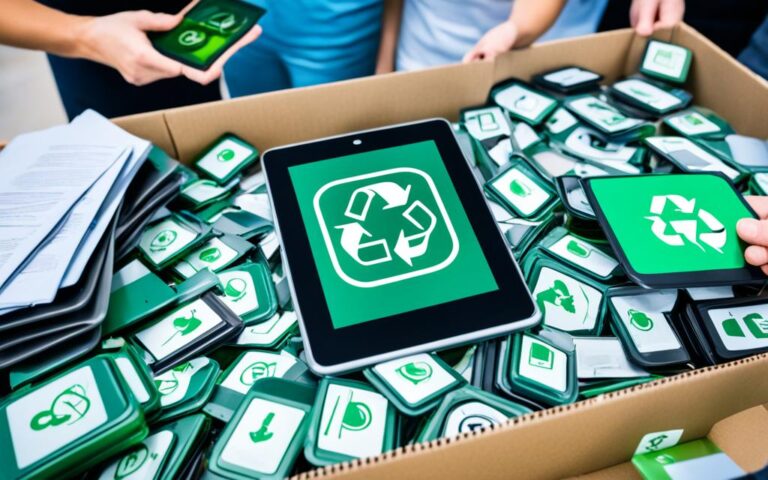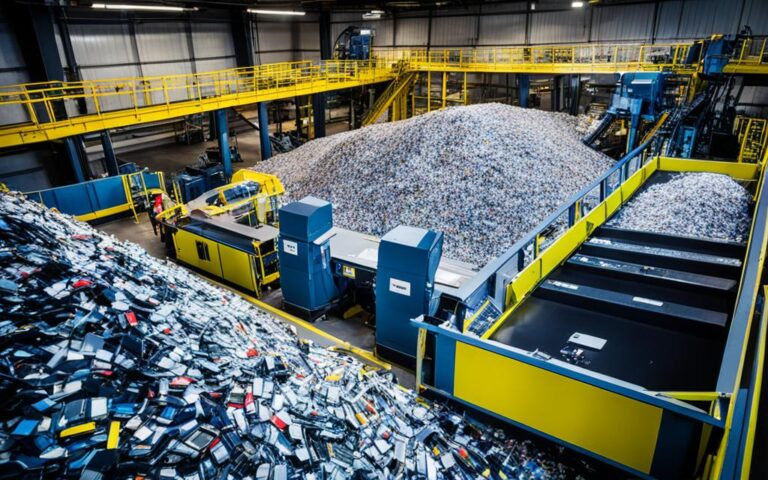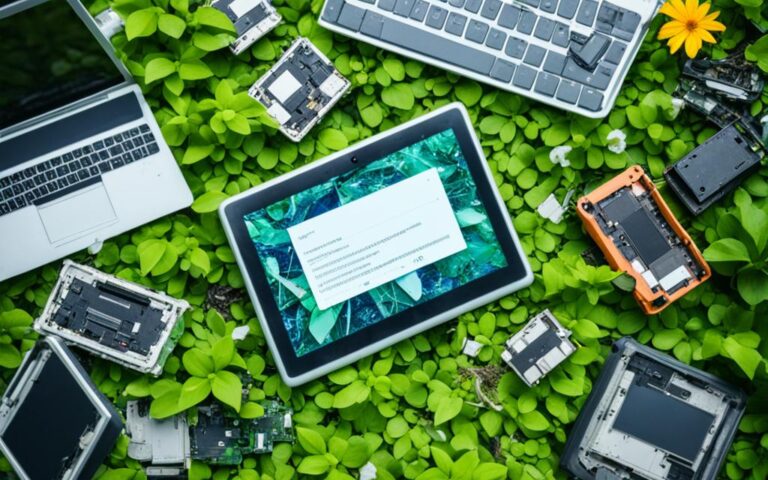The Economic Benefits of Recycling Tablets
Recycling tablets not only has significant environmental benefits but also offers various economic advantages. In this comprehensive guide, we will explore the economic benefits of tablet recycling, including cost savings through repurposing and reuse, reduced waste management costs, and the potential for revenue generation.
When it comes to repurposing and reuse, tablet recycling allows organizations to maximize their return on investment (ROI) on IT assets. By extending the lifespan of existing tablets and hardware components, companies can achieve substantial cost savings while improving operational efficiency. Harvesting valuable components from obsolete systems also provides unexpected cost savings, reducing the need for expensive replacements.
Furthermore, tablet recycling has a positive impact on job creation and economic stimulation. Recycling facilities require a diverse range of skills, providing employment opportunities for technicians, quality control experts, and logistics personnel. Entrepreneurial ventures in e-waste management and community programs also contribute to job creation and grassroots economic impact. Government incentives and public-private partnerships further drive economic activity in the recycling sector.
The sale of refurbished tablets presents another avenue for revenue generation. As consumers seek cost-effective and environmentally friendly alternatives, the market for refurbished electronics continues to grow. Working with certified recycling companies ensures quality assurance and builds consumer trust. Online platforms and marketplaces expand reach and revenue potential, while implementing effective pricing strategies maximizes profit margins.
Finally, tablet recycling plays a crucial role in material recovery and the circular economy. Electronic devices contain valuable materials such as gold, silver, and rare earth metals, which can be extracted and reused. This process not only contributes to sustainability but also offers a lucrative revenue stream. Embracing the circular economy further enhances the economic benefits of tablet recycling, creating new economic opportunities and reducing waste.
In conclusion, the economic benefits of tablet recycling are significant. From cost savings through repurposing and reuse to job creation, revenue generation, and material recovery, tablet recycling offers a sustainable and profitable business model. By embracing these economic advantages, companies can contribute to a greener future while enjoying the financial benefits of responsible electronic waste management.
Cost Savings Through Repurposing and Reuse: Maximizing ROI on IT Assets
One of the most compelling economic advantages of tablet recycling lies in the potential for significant cost savings through the strategic repurposing and reuse of hardware components. By extending the lifespan of existing IT assets, businesses can unlock a substantial return on investment (ROI) while improving operational efficiency and optimizing budget allocation. The repurposing and reuse of IT assets not only contribute to cost savings but also promote sustainability by reducing e-waste.
“The strategic repurposing and reuse of IT assets can lead to substantial cost savings and improved operational efficiency.”
When tablets reach the end of their lifecycle, it doesn’t necessarily mean that all components within them become obsolete. Many valuable hardware components can be salvaged and repurposed, resulting in unexpected cost savings for businesses. By harvesting and reusing these still-functional components from outdated systems, companies can maximize their ROI on IT assets and minimize unnecessary expenditure on new hardware.
“Harvesting valuable components from obsolete systems can provide unexpected cost savings for businesses.”
Moreover, repurposing and reusing IT assets also decrease the demand for new devices, reducing the need for fresh investments. This cost-efficient approach not only benefits the company’s bottom line but also contributes to a more sustainable business model. By embracing the circular economy and repurposing IT assets, businesses can actively participate in reducing electronic waste and the associated environmental and social impacts.
Through repurposing and reusing IT assets, companies can enjoy significant cost savings while minimizing their environmental footprint. By extending the lifespan of tablets and extracting value from components that would otherwise go to waste, businesses can make a positive impact on their budget and the planet simultaneously.
Job Creation and Economic Stimulation through Tablet Recycling
Tablet recycling initiatives have a multiplier effect on local economies, particularly in terms of job creation and economic stimulation. Recycling facilities require a diverse range of skills, providing employment opportunities for technicians, quality control experts, logistics personnel, and more. Entrepreneurial ventures in e-waste management and community programs also contribute to job creation and grassroots economic impact. Government incentives and public-private partnerships further drive economic activity in the recycling sector.
The Power of Job Creation
When it comes to tablet recycling, job creation is a significant benefit that cannot be overlooked. Recycling facilities require a skilled workforce to dismantle, sort, and process electronic waste. Technicians, with their expertise in electronics repair, play a crucial role in identifying and refurbishing usable components. Quality control experts ensure that recycled tablets meet strict industry standards, guaranteeing quality assurance for consumers.
Logistics personnel are essential for the transportation and distribution of collected tablets to recycling facilities. Their coordination and efficient supply chain management contribute to the smooth operation of the recycling process. By creating employment opportunities for these professionals, tablet recycling helps individuals secure stable jobs while enhancing the local economy.
Economic Stimulation and Sustainable Growth
Tablet recycling generates economic stimulation through various channels. The establishment of recycling facilities requires infrastructure development, leading to construction jobs and investments in the local community. Moreover, entrepreneurial ventures in e-waste management, such as refurbishing and reselling tablets, contribute to the growth of sustainable businesses.
Community programs also contribute to economic stimulation by creating innovative solutions for recycling and reusing tablets. These programs empower individuals to participate actively in the recycling industry, fostering a sense of community engagement and driving economic impact from the ground up.
Government Incentives and Public-Private Partnerships
Government incentives play a crucial role in promoting tablet recycling and supporting economic activity in the sector. By offering tax breaks, grants, and subsidies, governments encourage businesses to invest in recycling infrastructure and technology, stimulating job creation and economic growth.
Public-private partnerships further enhance economic activity by combining the resources and expertise of both sectors. Collaborations between recycling companies, government agencies, and non-profit organizations strengthen the recycling ecosystem and amplify its positive economic impact.
To realize the full potential of job creation and economic stimulation through tablet recycling, it is essential for individuals, businesses, governments, and communities to come together and embrace sustainable practices. By doing so, we can build a thriving recycling industry that not only benefits our environment but also drives economic growth and creates a better future for all.
Revenue Generation through the Sale of Refurbished Tablets: A Sustainable Business Model
Tablet recycling is not only environmentally beneficial but also presents a viable path to revenue generation through the sale of refurbished tablets. As consumers increasingly seek cost-effective and sustainable alternatives, the market for refurbished tablets is experiencing significant growth. By leveraging this demand, businesses can create a sustainable business model that combines profitability with environmental responsibility.
Working with certified recycling companies is paramount to ensure the quality and reliability of the refurbished tablets. These partnerships provide access to a steady supply of discarded devices that can be refurbished and sold, minimizing upfront investment and reducing the environmental impact of electronic waste. Additionally, collaborating with reputable recycling companies builds consumer trust, further enhancing revenue potential.
To maximize reach and revenue potential, businesses can leverage online platforms and marketplaces. These digital channels provide wide exposure to potential customers, enabling businesses to tap into a global market. By establishing a strong online presence, businesses can attract customers seeking affordable and sustainable options, driving revenue growth.
Implementing effective pricing strategies is crucial to optimize profit margins and maximize revenue. Balancing affordability with profitability is key to capturing market share and sustaining long-term success. Offering competitive prices while highlighting the environmental benefits of refurbished tablets can be a compelling value proposition for customers, driving revenue generation.
| Benefits of Selling Refurbished Tablets | Economic Impact |
|---|---|
| 1. Cost-effective alternative to new devices | Increased affordability for customers |
| 2. Environmental sustainability | Reduced electronic waste and carbon footprint |
| 3. Access to a growing market | Expanded revenue potential |
| 4. Collaboration with certified recycling companies | Quality assurance and consumer trust |
Customer Testimonial:
“Purchasing a refurbished tablet not only saved me money but also aligned with my values of reducing electronic waste. The tablet works perfectly, and I feel good about my choice to support sustainable business practices!”
– Rebecca Mitchell, satisfied customer
By embracing tablet recycling as a revenue generation strategy, businesses can contribute to environmental sustainability while tapping into a growing market. Adopting effective pricing strategies, collaborating with certified recycling partners, and leveraging online platforms can help businesses maximize revenue potential and build a sustainable business model that benefits both the bottom line and the planet.
Material Recovery and the Circular Economy: Extracting Value from Tablet Recycling
Tablet recycling offers a unique economic advantage through material recovery. Within electronic devices, valuable materials such as gold, silver, and rare earth metals are waiting to be harnessed and reused. This practice not only contributes to sustainability but also presents a lucrative revenue stream. By extracting these valuable resources, we can not only reduce the need for raw material extraction but also create a more efficient and sustainable supply chain.
Embracing the circular economy is another way to enhance the economic benefits of tablet recycling. Instead of following a linear model where products are discarded after use, the circular economy focuses on minimizing waste and maximizing the value of resources. The process of upcycling, transforming discarded materials into high-quality products, helps create new economic opportunities. Through this approach, tablet recycling becomes a catalyst for innovation, job creation, and economic growth.
By recovering valuable materials and embracing the circular economy, tablet recycling empowers businesses and communities to reduce waste and unlock economic potential. It allows us to reimagine the traditional linear model, creating a more sustainable and prosperous future. Drawing on the principles of material recovery and the circular economy, we can revolutionize the way we view electronic waste and harness its untapped value.
FAQ
What are the economic benefits of recycling tablets?
Recycling tablets offers significant economic advantages, including cost savings through repurposing and reuse, reduced waste management costs, and the potential for revenue generation through the sale of refurbished electronics and material recovery.
How can repurposing and reuse of tablet components lead to cost savings?
By extending the lifespan of existing IT assets through repurposing and reuse, organizations can achieve a substantial return on investment (ROI) and improve operational efficiency, allowing for better budget allocation and unexpected cost savings.
How does tablet recycling contribute to job creation and economic stimulation?
Tablet recycling initiatives have a multiplier effect on local economies by creating employment opportunities for technicians, quality control experts, logistics personnel, and more. Additionally, entrepreneurial ventures in e-waste management and government incentives further drive economic activity in the recycling sector.
What revenue generation opportunities does tablet recycling offer?
Tablet recycling provides revenue generation opportunities through the sale of refurbished electronics. As the market for cost-effective and environmentally friendly alternatives grows, working with certified recycling companies, implementing effective pricing strategies, and utilizing online platforms and marketplaces can maximize revenue potential.
How does tablet recycling contribute to material recovery and the circular economy?
Tablets contain valuable materials like gold, silver, and rare earth metals, which can be extracted and reused. Recovering these materials not only contributes to sustainability but also offers a lucrative revenue stream. Embracing the circular economy and upcycling further enhance the economic benefits of tablet recycling.















